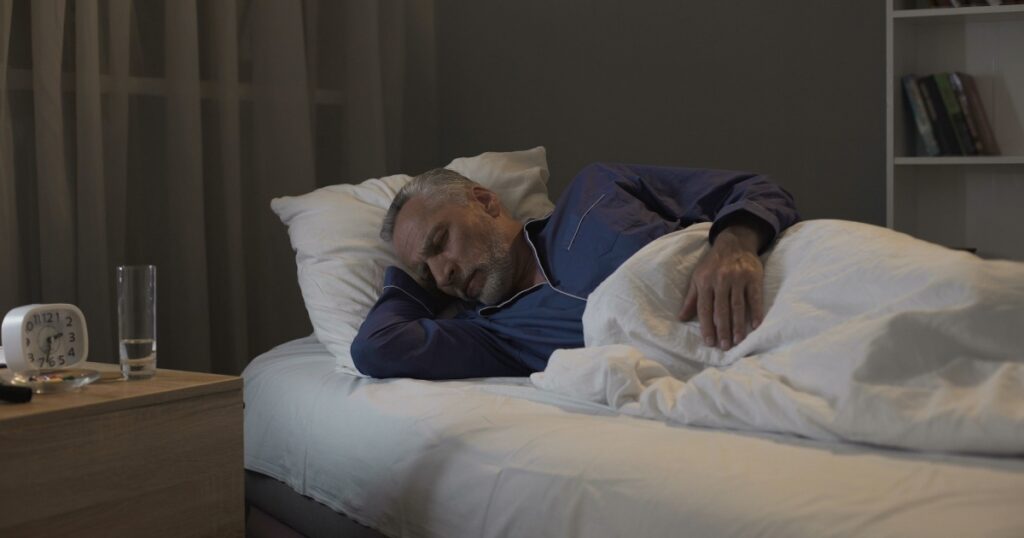Dementia symptoms manifest in different ways. While memory loss and having difficulty with routine tasks are the commonly recognized symptoms, there’s a much subtler indicator that has often gone overlooked – daytime napping. According to Dr. Rayaz Malik, a professor at Weill Cornell Medicine, frequent daytime napping could be a behavior associated with dementia.1 This observation is also supported by the Alzheimer’s Society, saying individuals in the later stages of dementia often tend to feel sleepy.
Sleepy Dementia Symptoms

Recent studies have shed light on the relationship between napping and dementia. Research in older adults found that as Alzheimer’s progresses, the frequency and duration of daytime naps tend to increase.2 Additionally, excessive napping may be a risk factor for cognitive impairment, which can come before Alzheimer’s. While it’s important to recognize excessive daytime napping as a potential symptom of dementia, it’s equally as important to understand why. Studies suggest that dementia can affect neurons designed to wake us up, which could change our sleep patterns.3 Brain exams have shown that individuals with Alzheimer’s have fewer wake-promoting neurons, meaning it is easier to fall asleep during the day as there are less neurons fighting the good wake-up fight.
Read More: Two Subtle Signs of Dementia You Should Look Out for at Home
Consistency is Key

If you’re worried about dementia symptoms, managing sleep patterns becomes essential. Establishing a regular bedtime routine and limiting daytime naps can help regulate sleep. Additionally, incorporating physical activity into daily routines and reducing caffeine intake may contribute to better sleep quality. Dr. Kun Hu of Harvard Medical School states: “The vicious cycle we observed between daytime sleep and Alzheimer’s disease offers a basis for better understanding the role of sleep in the development and progression of Alzheimer’s disease in older adults.”
Seeking Support

Excessive daytime napping isn’t something to ignore, especially among older adults. If someone is experiencing persistent daytime sleepiness for more than a couple of weeks, they should consult a healthcare professional. Addressing underlying causes early on can help in managing or even potentially slowing down cognitive decline. Studies on the relationship between napping and dementia continue to provide valuable insights. A study led by UC San Francisco and Harvard Medical School found that excessive daytime napping can accelerate along with dementia. The two can build off each other, with other dementia symptoms growing, leading to more daytime naps leading to increased dementia, not a great cycle. It is incredibly important to monitor sleep patterns in case of potential cognitive decline.
Potential Intervention Strategies

Researchers are also exploring potential interventions like cognitive stimulation activities, physical exercise programs, and sleep hygiene education to improve cognitive function. By tackling multiple angles of lifestyle and health, there may be a better chance of maintaining cognitive function as people age.
Getting Everyone Involved

Recognizing the symptoms of dementia is crucial for caregivers as well. Caregivers play a vital role in an individual’s well-being, and being able to see changes in sleep patterns can help them provide appropriate and timely support for any medical interventions. Raising awareness about daytime napping and dementia symptoms is essential for public health initiatives. Educating the public about early signs of dementia can empower individuals to get medical advice and attention before the condition reaches later stages.
The Data Doesn’t Lie

A study led by investigators from Brigham and Women’s Hospital in collaboration with Rush Alzheimer’s Disease Center and University of California, San Francisco, presented more compelling evidence linking excessive daytime napping with an elevated risk of Alzheimer’s disease.4 The researchers utilized data from the Rush Memory and Aging Project, tracking over 1,000 older adults over several years. Through wrist-worn devices and cognitive assessments, they observed a notable increase in daytime napping duration and frequency correlating with cognitive decline. Importantly, the study highlights a bidirectional relationship: excessive daytime napping predicts future AD risk, while AD diagnosis accelerates daytime napping, indicating a vicious cycle.
Be Mindful of Your Daytime Nap Quantity/Consistency

Conducted by UC San Francisco and Harvard Medical School researchers, this study offers further insights into the relationship between daytime napping and dementia.5 Utilizing data from the Rush Memory and Aging Project, the researchers tracked over 1,400 seniors, observing a significant correlation between excessive daytime napping and cognitive impairment. Notably, the study demonstrates that the frequency and duration of daytime napping escalate rapidly following a diagnosis of mild cognitive impairment or Alzheimer’s disease, suggesting a potential marker for disease progression.
Closing Thoughts

While daytime naps can be part of the aging process, it could also be a subtle indicator of underlying cognitive decline or even dementia. By recognizing the link between the two, individuals, caregivers, and healthcare professionals can work together to support cognitive health and quality of life in older adults. Dr. Peng Li says “[d]aytime sleep behaviors of older adults are oftentimes ignored, and a consensus for daytime napping in clinical practice and health care is still lacking. Our results not only suggest that excessive daytime napping may signal an elevated risk of Alzheimer’s dementia, but they also show that faster yearly increase in daytime napping may be a sign of deteriorating or unfavored clinical progression of the disease.”
Read More: 10 Medications Linked to Dementia
Sources
- “Common habit during day is little known symptom that could mean you have dementia.” Mirror. Tim Hanlon. January 26, 2024.
- “The link between napping and Alzheimer’s.” Medical News Today. Mary West. August 16, 2023
- “Extended Napping in Seniors May Signal Dementia.” UCSF. Suzanne Leigh. March 17, 2022.
- “Excessive napping and Alzheimer’s linked in study.” Harvard. Manisha Vadali. March 17, 2022.
- “Extended Napping in Seniors May Signal Dementia.” UCSF. Suzanne Leigh. March 17, 2022.

